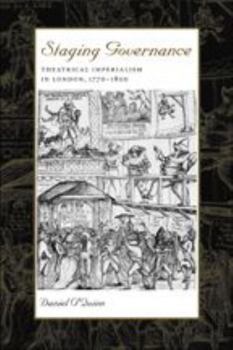Staging Governance: Theatrical Imperialism in London, 1770-1800
Between 1770 and 1800, transformations in the relationship between metropolitan British society and its colonial holdings, and in the concept of the nation itself, left Britons with a new sense of themselves. Over the same period, the consolidation of the middle classes was accompanied by growing social constraints on sexuality and family life. Staging Governance locates the intersection of these two trends in the representation of British India on the London stage. Theatrical productions, especially those representing colonial life, pushed the limits of public discourse on sexuality and colonialism even as the government made efforts to shape and narrow them. At the same time, official discourse on colonial practices, such as the public trials of Clive and Hastings, became theatrical events themselves.
Exploring this rapidly shifting world through a series of original readings of dramatic texts and important moments of oratory, Staging Governance demonstrates how the perceived crises of imperial and domestic Britain joined these spheres in the popular imagination. The economics of political and sexual exchange not only became entwined but functioned as mutual supports during a period of social, cultural, and political readjustment.





